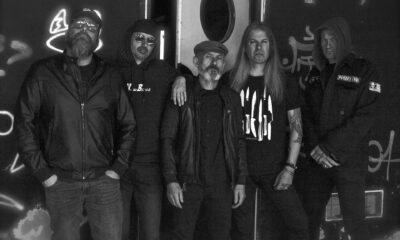Interviews
In Conversation with MÖRGLBL: Guitarist CHRISTOPHE GODIN on His Jazz Metal Band’s New Album, the Gear He Uses, and Life in Academia
Catherine Fearns chats with Christophe Godin, frontman of French progressive jazz-rock-metallers MÖRGLBL, about a range of issues, including their new album The Story Of Scott Rötti, and Christophe’s life as a guitar teacher at the École des Musiques Actuelles.

With their absurdist cartoon album covers, and song titles including “Banjovi,” “Döner Dörgasm” and “Wig Of Change,” it’s safe to say that MÖRGLBL don’t take themselves too seriously. For over twenty years the French progressive jazz-rock-metallers have been experimenting with genre and delighting fans worldwide with their funny live shows. But the silliness belies an extraordinary level of musicianship. Their seventh album, The Story Of Scott Rötti (which you can purchase right here), is a tour-de-force of sparkling musical wit; heavy riffs, jazz licks, quirky melodies, and constant surprises are knitted seamlessly into a technicolor soundscape that instantly sparks a good mood.
Mörglbl are comprised of Ivan Rougny (bass), Aurelien Ouzoulias (drums), and Christophe Godin, a guitar clinician of world renown. He has been regularly featured in guitar magazines and an international ambassador for Vigier guitars, Laney amps, and several other brands. We caught up with him to chat about teaching, touring, and the real story behind Scott Rötti….
Christophe confesses that Mörglbl’s titles and themes are often made up during evenings of hilarity and drinking; “All our album titles are completely random. This time we came up with the idea to create a fake concept album, a sort of western about a guy who wants to conquer America with wines and… I don’t even know how to tell you! It’s funny because people keep asking, who is Scott Rötti, what’s the story, and we actually have no clue. That’s what we always do with our albums, there’s always one song included that has the album’s title, but it’s really random.”
Check out this live, on-stage performance of “Anarchytektür,” one of the standout tracks on The Story Of Scott Rötti.
In case you hadn’t guessed yet, humour is the modus operandi of Mörglbl. From the laugh-out-loud collage designs of their album covers, through an overgenerous sprinkling of umlauts into the song titles, to the comedy special effects, their music is riddled with cheerful absurdism. The trio, who all contribute equally to the writing process, can’t hide their technical prowess though; heavy groove metal riffs segue into jaw-dropping guitar solos and jazz drumming, and there are moments of poignant beauty too. But what dominates throughout is an overwhelming sense of joy. For Christophe, this is an essential part of the band’s DNA. Does he think it’s important to inject more humour into metal or the music industry as a whole?
“I think the world needs more humour! When you turn on the radio or the TV there’s always bad news popping up and sometimes you just want to have something a little light. We are three very humorous characters in different ways. We all have this compartment in our brain and we are always trying to make each other smile and make other people smile. I’ve always been into cartoon music. I love Frank Zappa. I love the Beatles, and the Beatles were very funny. I think it’s a way of getting people to listen to that complex music. Music can take itself quite seriously and that can be off-putting. So humour makes it more accessible, and very few progressive rock bands play funny music.” Christophe cites Twelve Foot Ninja and Mr. Bungle as rare counter-examples; bands he admires who use humour to engage listeners with technicality.
Mörglbl are a genre-spanning band. Although it’s difficult to compare them to anyone, they’re a sort of Frank Zappa meets Animals As Leaders meets Pantera. The music is bonkers but so beautiful and tightly constructed that it’s a very easy listen and you don’t even notice the absence of vocals. Having a foothold in several genres can have its disadvantages. “There are times when we want to play jazz festivals and they consider us too metal. And sometimes when we play metal festivals we have people who feel a little rejected by the jazz sophistication of our sound. But, in fact, the metal world is much more open-minded than the rest, and over the past twenty years, metal bands have been incorporating a lot of different musical elements. I think it’s an advantage overall. It’s a way for us to play lots of different venues and to be more easily understood.”
From the album Tea Time For Punks, comes the riffing magic you hear in this “Treeball” performance video.
Christophe has been teaching guitar at the École des Musiques Actuelles, a contemporary music academy in Geneva, for over 28 years, and has seen many of his pupils go on to become professional guitarists and guitar teachers themselves. Pedagogy has always been an important aspect of his musical life. “It’s really something I could stop doing now because money-wise I’m ok, but I want to keep on doing it. These young kids always come up with something fresh in terms of new music for me, things I wouldn’t be listening to otherwise. They also make me think about my playing because sometimes they are working on things that I kind of forgot. You know, rhythm, scales, techniques, very basic things that you forget to work on, having students brings me back to those things. So that probably helps me improve my playing too.”
Christophe runs the Metal 4 Kids programme at the academy, which gives children the experience of playing in a band. He regularly performs on stage with his students, and they all look as if they’re having the time of their lives. “When you are considered a role model to these kids, it’s good to feel a little responsible about the way you act, the way you behave and the way you are. It’s like, I have my kids, but I also have those kids and they are my musical kids. And that’s a great relationship because you feel that someday, they’re going to play way better than me! Some of them will make it into a career and it’s fantastic to see them growing up. Little by little I see their personalities becoming more confident as they play better and better.”
Watching new generations of kids come through the school, has he noticed anything change in their musical ambitions, attitudes, and interests?
“I think musical culture has changed a lot. Now it’s very easy to listen to all kinds of music just by clicking. You go on the internet and get anything you want, but it’s very much as if you just scratched the surface. You never get really deep into anything. When I was a kid, I started playing at 13, I remember I would spend hours just listening to one vinyl, and I knew everything about it. I knew where it was recorded and what equipment they used, all the lyrics. Do you remember those days, when you would just live one album over and over? It was fantastic. We had a ritual with some friends on a Wednesday afternoon. Everybody would come with their new vinyl and we’d just sit around the record player and listen to what the others brought, and it was magical because nobody was speaking, just listening and looking at each other. Nowadays you don’t do this anymore because people stay at home, on their own, facing a screen, skipping from one song to another. It’s not the same. So young players are not as musically cultured. They don’t have an in-depth knowledge of the music and are probably not as passionate as they were in the past, because there’s just too much choice.”

Since the 1980s when guitarists such as Eddie Van Halen and Randy Rhoads raised the standards of electric guitar playing forever, the technical level required for a guitarist to be in any sort of metal band is incredibly high. The time, effort and study required is entirely comparable with classical instruments. But outside of metal this is still not always recognized. As a virtuoso musician, Christophe occasionally crosses paths with the classical world.
“I once had to perform with the prestigious L’Orchestre Philharmonique de Radio France, on a huge project with actors, a choir and a full orchestra. We had one month of rehearsal before playing the first gig, and when I appeared with my electric guitar, they just looked at me as though he’s some clown who’s not really one of us. Not a real musician. But then they saw me practising before going on stage to rehearse and thought, oh ok, he’s practising, he has a bit of discipline and training. And then came the moment when I had to perform and they were like, oh, ok. It took a couple of days before they accepted me, but then they understood that it was a real instrument. Anyway, in rock and metal we have many more people in our audiences than attending classical concerts, so we get our reward!”
Even at Christophe Godin’s level, in order to make a living, musicians need a portfolio approach to their careers, with teaching, performing, recording, endorsements and marketing all having to go into the balance. Which aspects of this does Christophe like and dislike the most?
From their official live DVD, Live and Loud for the Deaf, experience the tune “The Tale of Thibault.”
“I think I’m very lucky; all the different sources of income are equally rewarding. What you do as a teacher is rewarding in terms of growing talent for the future. My sponsors are very important because they provide me with the best possible tools. They need my feedback, I need their feedback, and I’ve been working with the same companies for more than 21 years, my main sponsors being Laney, Vigier, and Zoom. Without them, I wouldn’t be where I am. Now I’m involved with these companies to help them build and test new products. I did the final demonstrations of the Toni Iommi amplifier in front of the man himself. I was shaking! I have toured the whole world thanks to Laney. I also do clinics, masterclasses. The clinics are very cool because they are very intense; you are with people you might never see again, for an intensive two-hour session. Then there are the shows (Christophe has performed over 400 concerts in the last five years) which are what I like the most but provide much less money. And the record sales are even smaller. Although we sold a lot of copies of our last two albums, 10,000 copies of each is not bad at all.”
Mörglbl are heading out on tour this year to promote the new album. “We have many concerts in France, that’s our main market, and these are like warm-up shows because we go to places where people know us, so it’s not a huge risk. Then we will be in the US in August and September. We will also return to China which is a huge and growing market for us. In China, there are a lot of people who are increasingly into virtuosity. Laney help us to play over there and we do a lot of clinics there. We also have things planned in Russia, Kyrgyzstan… basically a couple of years of touring ahead, but in short legs here and there.”
And finally, how can we resist asking Christophe for a quick rundown of his guitar rig.
“It’s very easy because it’s very basic, I’m a low-tech kind of guitarist. I plug my Vigier guitar into a volume pedal, which acts like the volume knob of my guitar. So I just use my foot, I play at full distortion and use the pedal as a break. Sometimes I use a wah pedal too if I remember it. But basically in between the guitar and the amp I have the volume pedal, and then in the loop I use a very cheap Zoom multi-effects where I have a chorus, a delay, and that’s it. I plug this into the GH50L amp head from Laney. Then I turn it up very loud, and it works fine for me!”
-

 Music5 days ago
Music5 days agoTake That (w/ Olly Murs) Kick Off Four-Night Leeds Stint with Hit-Laden Spectacular [Photos]
-

 Alternative/Rock7 days ago
Alternative/Rock7 days agoThe V13 Fix #010 w/ High on Fire, NOFX, My Dying Bride and more
-

 Alternative/Rock2 weeks ago
Alternative/Rock2 weeks agoA Rejuvenated Dream State are ‘Still Dreaming’ as They Bounce Into Manchester YES [Photos]
-

 Features5 days ago
Features5 days agoTour Diary: Gen & The Degenerates Party Their Way Across America
-

 Culture1 week ago
Culture1 week agoDan Carter & George Miller Chat Foodinati Live, Heavy Metal Charities and Pre-Gig Meals
-

 Music1 week ago
Music1 week agoReclusive Producer Stumbleine Premieres Beat-Driven New Single “Cinderhaze”
-

 Alternative/Rock1 week ago
Alternative/Rock1 week agoThree Lefts and a Right Premiere Their Guitar-Driven Single “Lovulator”
-

 Alternative/Rock1 week ago
Alternative/Rock1 week agoDeath Wishlist Are Fiery and Fierce with Their “I Get Bored” Video Premiere












